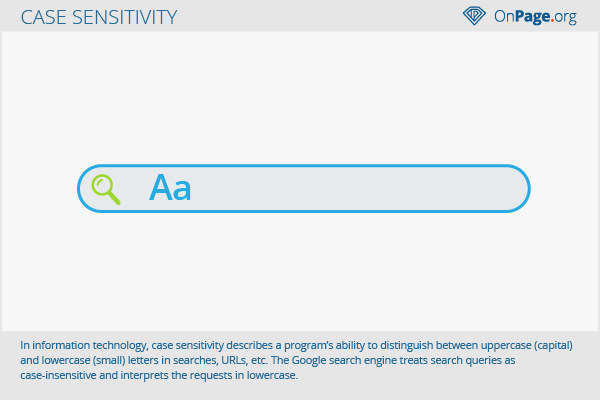Case Sensitivity
In information technology, case sensitivity describes a program’s ability to distinguish between uppercase (capital) and lowercase (small) letters in searches, URLs, etc.
Importance for searches
The Google search engine treats search queries as case-insensitive and interprets the requests in lowercase. An example to illustrate this could be as follows: “nelson mandela,” “Nelson Mandela,” and “NELSON MANDELA” would return the same search results. For certain searches, it would be important if the letters are lower or upper case.
An example will show the problem that could arise: when searching for “Ram” (Hindu deity) or “RAM” (abbreviation for Random Access Memory) the search engine cannot differentiate and interpret the terms correctly due to lack of case sensitivity. Google plans to introduce “case-sensitive search” in the near future to resolve this problem and be able to interpret the searches in the right context. This may mean that case-sensitive URLs will become important.
Importance for domains and URLs
Domain names are usually case-insensitive, meaning domain names are read by the computer in lowercase. The remaining address (URL) can be case-sensitive depending on the server configuration. A website is hosted on a server that constantly processes server queries and returns via URLs referenced pages. Servers with Windows operating systems do not take case sensitivity into account. All URLs (whether lower or upper case) are translated into lower case. For example: the URL “ryte.com/urls-are-case-sensitive.htm” and the URL “ryte.com/URLs-are-case-sensitive.htm” are interpreted as the same URL address.
By contrast, a server that is based on a Linux or Unix operating system will interpret lower and upper case or case-sensitive URLs differently and consider them unequal addresses. Example: “ryte.com/TipsandTricks.html” and “ryte.com/tipsandtricks.html.”
AS a webmaster, it is recommended to inform yourself about how case sensitivity is handled on the server side prior to selecting a web server.
Canonical tag
You can also solve the case sensitivity problem with canonical tags. If the Web server does not handle case-sensitive URLs, you can direct the URL to the original URL via canonical tags and thus direct the search engine to where the original content is.
<link rel="canonical" href="http://www.mysite.com/my/case/sensitive/path/" />

